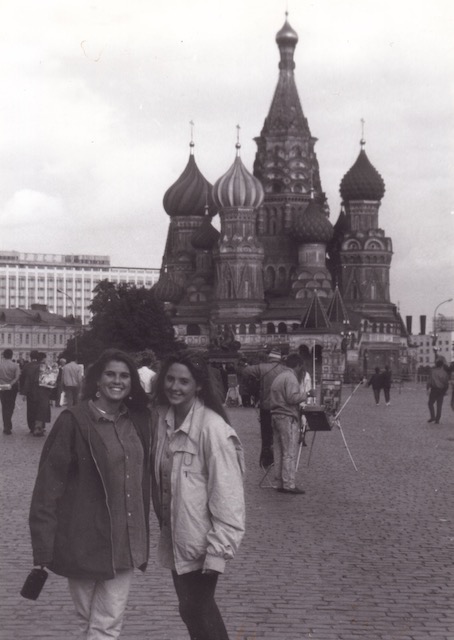By Jeffrey Carl

Working at the Westmoreland News in 1994 was the best summer job I ever had. I worked for peanuts and had a two hour drive each way from Richmond, but I got to do it all at a small county newspaper where I was a reporter, feature writer, copy editor, layout editor and photographer (because there was nobody else to do those things). Best of all the paper’s editor, Lynn Norris, gave me the freedom to write whatever I wanted – way more journalistic and comedic freedom than anyone should rightly give a know-it-all 21-year-old writing for a weekly in the deeply rural Northern Neck of Virginia.
Dennis W. Stockton writes a newsletter. It comes out about every month, give or take. It is called “Passin’ Thoughts.” Dennis writes about whatever comes to mind or happens in his life, like a public diary. He has written about everything from killing ants to running for governor of Virginia to replacing Rush Limbaugh to the history and usage of toilet paper. Dennis writes on a Panasonic typewriter, sitting alone in his room. Actually, it’s a cell. Dennis W. Stockton is on Death Row.
The masthead of “Passin’ Thoughts” bears a parody of the New York Times’s motto, reading “All the news fit to print … and some that ain’t.” It says, “COMPILED FROM DEATH ROW!” in all-capital letters and is copyrighted to “Dennis Walden Stockton, #134466, Powhatan Correctional Center, State Farm, Virginia 23160.” Interspersed between stories there are quotations from sources like John Steinbeck, Leon Uris, the New Testament, and, of course, Dennis Stockton.
“Whether an O. Henry writing his short stories from a jail cell or a frightened young inmate writing his family, a prisoner needs a medium for self-expression.”
– former Supreme Court Justice Thurgood Marshall, as quoted in “Passing Thoughts”
Dennis Stockton’s newsletter is often quite funny. Stockton and his occasional guest writers take on numerous subjects – it’s something of a writer’s dream, all that space to write and nobody to tell you what to write about. His humor is a gift-wrapped box, and inside the box holds bitterness, frustration, and madness. Stockton staunchly maintains that he is innocent, and occasionally invokes Christ to give him the strength to withstand his unfair imprisonment. The status of his court appeals is kept track of in special updates in “Passin’ Thoughts,” in between stories about his experiences and his plans.
“If you elect me as your governor I’ll put a stop to all this fraud and waste … I know how to cut the cost of operating prisions in half and will do it as soon as I move in the governor’s mansion … I know you’ve heard them other candidates say over the years how it cost $25,000 per inmate to keep people in prisons … I’ll turn all the prisoners loose and pay them $12,500 a year to stay out of jail. Just like that I’ve cut prison budgets in half. If any double-cross me and commit a crime I’ll shoot those and get them out of their and our misery…”
– Dennis Stockton, “Passin’ Thoughts”
This is strangely, ironically funny, coming from a man waiting to be killed by the state. And sometimes you’re never quite sure what to take seriously and what to recognize as a joke. All these topics, the ambitious (like Stockton’s gubernatorial candidacy plans) and the mundane (congratulating Dale Earnhardt on his NASCAR Winston Cup win) are handled in Stockton’s fascinating writing style. Stockton takes the quirks of slang speech – the “hafta”s and the “it ‘uz”s – and puts them in print, just like they sound. It makes engaging and easy reading, and makes you feel like Stockton is sitting there beside you – behind an iron wall of bars – and talking to you.
“I use to be one of those that used handkerchiefs for nose-blowin’. Like many, I had a habit of blowin’ my nose into a handkerchief and foldin’ it up carefully and then shovin’ it into my back pocket and walkin’ around with a pocket full of sneeze. That was before I learned handkerchiefs were suppose to be kept clean so’s you’d have one handy when you ran into a beautiful lady in tears and could diplomatically pull it out and offer it to the distressed one so she could dry her tears and blow her purty little nose in it. Then, if she returned the handkerchief, you could walk around with a pocket full or her carefully wrapped sneeze, but prob’ly wouldn’t mind for by then you’ve done got a date with the purty little thing you were such a comfort to.”
– Dennis Stockton, “Passin’ Thoughts”
The stream-of-consciousness writing of the newsletter is also broken up by photocopies of letters written by Stockton to the prison warden, complaining that his television has not been returned since it was broken by guards in the last “lockdown for a shakedown” or decrying the infrequent showers allowed to the men on his cell block. It’s a little like reading the mutant offspring of Andy Rooney’s columns and Alexander Solzhenitsyn’s “The Gulag Archipelago”: the funny stories about life are contrasted with an obsession with the tiniest elements of life: the television set, the toilet paper, the shower, the bugs on the wall. There is not much to do on Death Row. And Stockton tells you in vivid detail what it’s like to do a whole lot of not much: the tiny details of existence that are no more than annoyances to people on the “outside” are maddeningly major events to a prisoner. Stockton talks for pages about killing the ants in his cell – he not only kills them, but counts them, and marks when he kills flies on his calendar. Time passes slowly there, and the smallest images become important.
“The same ain’t so for ribbons. I got 28 1/2 pages outta my last ribbon. 27 of them were double-spaced kind while the other 1 1/2 were single-spaced … like this’n. Before startin’ this issue I put ribbon #12 in that I’ve used so far, since gettin’ this machine in late August. They charge me $4.35 for each ribbon in the Canteen …”
– Dennis Stockton, “Passin’ Thoughts”
•
Postcards from the edge. Notes from the underground. Confessions of the condemned. Voices from beyond. Straight outta Compton. Federal Express from hell. Pick your name for these testimonials. Here they are called, simply, “Prisoners’ Warnings.”
Stockton’s notes above, and the following letters are prisoners’ warnings to young people of the area. The letters are accompanied by a letter from the organizers of this project. The introductory letter says the prisoners’ warnings are “written by reformed inmates who are willing to share the hard life of prison survival,” according to Lethia A. Johnson and the Reverends C. Long and F. Brooks.
“A life where it doesn’t matter that your days are spent in a cell with only enough room to sit, stand and sleep.
“These young people are now labeled as numbers. They have searhed their souls and are willing to share the price they had to pay for the mistakes they made.
“Their hopes and prayers are that young people would read their story andthink twice before commiting a criminal act.
“These writers are involved in community projects and are trying to find themselves in Christ, although they sometimes fail due to the lack of faith, leaderhsip and guidance.”
Lethia Johnson notes that Siloam’s pastor Reverend Long and his wife Margaret are working together with young men gathered by Keith Jones, Roger Brooks and Myron Johnson, the church’s deacons, and New Jerusalem’s Pastor.
“The theme of their first meeting, which might be considered suitable for the entire project, is You Are Your Brother’s Keeper. I am asking the community to join in and help us preserve our next generation,” Johnson adds, and the letter ends neatly with the names of Johnson, the Rev. Long, and the Rev. Brooks. The letter is sparsely punctuated and is typed in all-capital letters.
•
Joseph R. “Poncho” Brown writes that as of March 21, he was feeling “fine and very blessed, growing stronger with the Lord ever day.” His letter is pure evangelical testimony– an account of faith and how it is often the only thing left for some when all the other things have fallen apart. It is easy to forget sometimes that prisoners have families, too, and that time does not stand still for them while a sentence is being served.
“It’s more apparent to me now – more than ever – that my calling is to touch as many young lives as possible. When my sons came, my youngest (nine years old) asked me why I was in here. I don’t know just why he’s questioning me about, but Iwas very honest with him. I will not rest until I know that their lives have bypassed the life I’ve been living for the last 12 years. School is the key right now for them, and they enjoy it very much…”
•
The top of the letter is signed, “Carlton Ford #156984.” The handwritten letters on the page are tidy, looping whorls, like Thomas Jefferson’s. The words are crammed together on the page, like the terse writing of someone who has something to say and doesn’t know if they’ll get a chance to say it unless they can write it fast enough. It tells a story about a life that has gone wrong, about a boy who started out “straight” but became a product of an environment where hope had packed its bags, left, and forgotten about them. It talks about living in a world of crime that is like some incomprehensible, faraway parallel universe to some, and the deadly everyday world to others.
“All I wanted was to do was just make my grandmother the happiest grandparent in the world. I remember promising to her that I would never drink liquor, beer, or take drugs, but most importantly I promised to her that I would never go to jail and leave her alone. In return, she gave me a strict curfew, rules and regulations, attention and affection, but most importantly she gave me unconditional love … I gave her good grades in school, discipline, respect, and was on my way to becoming that young man that I promised her I would be… But some thing drastically changed in me, and I didn’t even see it coming.
“In the seventh grade, I moved to live with my mother in a project unit in Alexandria. The children my age seemed like little adults to me, and I felt as though I had nothing in common with them or the envirnment, where crime, drugs and sex seemed to be the major focus.
“I had to somehow achieving ghetto mentality. Peer pressure is addivctivefor a mind tatdoes’t know how to us its reflectfulness or be toughtful in decison making. I got inolved in all types of crime: stealing cars, breaking into houses became a routine type of thing for me. All we did was shoot basketball and get high in daylight; at night, we traveled the streets looking to commit some larceny. i dropped out of school impregnated a girl and had a few brushes with the law, but the worst was about to come.
“That night, four of us had stolen a car, and a police car started chasing us. We hit the wall. All of them died except for me.
“For my part, the judge sentenced me to six months in a boys’ home. Upon my release, I immediately got back into my old scene, peddling drugs, burglaries, and anything else that would put money in my pockets. I was ducking and dodging like that all the way to this present incarceration.
“I’ve gone down for four and one-half years on this charge, but more importantly, I have done a lot of thinking. Never in all my life have I ever done such deep-rooted reflecting on my past and future. Where did I go wrong? How did I go wrong? What happened to that little boy who wanted to grow up and make his grandmother proud? Surely he is still within me somewhere. I’m still going to make her happy, God rest her soul…”
•
What do you say about these letters and writings from reformed prisoners? They are like sermons from fallen angels, ghostly messages on the important things in life from those who have lost their lives in the “real world.” But, aside from repentance, what are these testimonials really about?
Dennis Stockton’s writings are funny and bleak and riveting and disorienting. But most of all – they show what life is like, waiting to die. They show what is there waiting for you at the end of the universe: nothing. Absolutely nothing. Nothing to do but kill flies and count them on the calendar. Nothing to talk about but the petty torments inflicted in imprisonment. Nothing to think about but the tiniest details of your life, or to make up grandiose stories about the world outside to live through the actions of others. Dennis Stockton writes indirectly about what stares at you when you are sitting, waiting for the end: nothing. And the cold stare of boredom – the empty eye-sockets of nothingness- are worse than the curse of fear, or the sting of pain, or even the icy gaze of evil. There may be another world waiting for Dennis Stockton, but for right now there is nothing to do but wait and – to make something happen, if only in imagination – to tell stories.
“I died last night. It was sometime after I went to bed. I’m not sure of the exact time, and since I was dead I couldn’t open my eyes and look. But sometime after 11 o’clock I went to bed. My bed is in a cell for I’m (or was) a prisoner.
“… But the way it turned out is I suppose what’s in the dark recesses of everyone’s mind about what being dead is like. There’s only one thing for a dead person to see and you don’t need eyes to see it.
“I don’t know whether to tell you I’m sad or glad that I died. At least I’m no longer in prison for something I didn’t do …
“One of the best points of being dead is that I’m free from worry, persecution and ridicule along with all the little things that made my last 13-plus years on earth the low points. The high points also include I know now – that God is real and that when I was baptized on 3/1/1991 He did indeed do all the things His book taught me He would.
“I miss all (too many to count) the friends I came to know after I was baptized. If I could say one thing only to them it’d be, ‘Stay the course and never doubt God’s promises in the least.’
“I wish I could write these lines and send them to everyone on earth, but I can’t for the dead these days can’t talk to the living. For the fact I’ve learned since dying is that the dead, like me, know nothing.”
– Dennis Stockton, “A Short Story”



